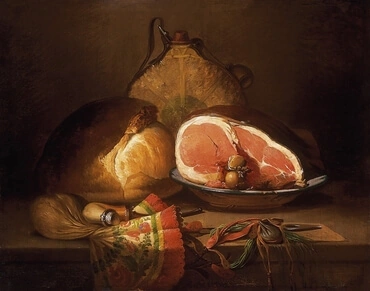1
우리가 사로잡힌지 이십 오년이요 성이 함락된 후 십 사년 정월 십일 곧 그 날에 여호와의 권능이 내게 임하여 나를 데리고 이스라엘 땅으로 가시되
2
하나님의 이상 중에 나를 데리고 그 땅에 이르러 나를 극히 높은산 위에 내려 놓으시는데 거기서 남으로 향하여 성읍 형상 같은 것이 있더라
3
나를 데리시고 거기 이르시니 모양이 놋 같이 빛난 사람 하나가 손에 삼줄과 척량하는 장대를 가지고 문에 서서 있더니
4
그 사람이 내게 이르되 인자야 내가 네게 보이는 그것을 눈으로 보고 귀로 들으며 네 마음으로 생각할지어다 내가 이것을 네게 보이려고 이리로 데리고 왔나니 너는 본 것을 다 이스라엘 족속에게 고할지어다 하더라
5
내가 본즉 집 바깥 사면으로 담이 있더라 그 사람의 손에 척량하는 장대를 잡았는데 그 장이 팔꿈치에서 손가락에 이르고 한 손바닥 넓이가 더한 자로 육척이라 그 담을 척량하니 두께가 한 장대요 고도 한 장대며
6
그가 동향한 문에 이르러 층계에 올라 그 문통을 척량하니 장이 한 장대요 그 문 안통의 장도 한 장대며
7
그 문간에 문지기 방들이 있는데 각기 장이 한 장대요 광이 한 장대요 매방 사이 벽이 오척이며 안 문통의 장이 한 장대요 그 앞에 현관이 있고 그 앞에 안 문이 있으며
8
그가 또 안 문의 현관을 척량하니 한 장대며
9
안 문의 현관을 또 척량하니 팔척이요 그 문 벽은 이척이라 그 문의 현관이 안으로 향하였으며
10
그 동문간의 문지기 방은 좌편에 셋이 있고 우편에 셋이 있으니 그 셋이 각각 한 척수요 그 좌우편 벽도 다 한 척수며
11
또 그 문통을 척량하니 광이 십척이요 장이 십 삼척이며
12
방 앞에 퇴가 있는데 이편 퇴도 일척이요 저편 퇴도 일척이며 그 방은 이편도 육척이요 저편도 육척이며
13
그가 그 문간을 척량하니 이 방 지붕 가에서 저 방 지붕 가까지 광이 이십 오척인데 방 문은 서로 반대되었으며
14
그가 또 현관을 척량하니 광이 이십척이요 현관 사면에 뜰이 있으며
15
바깥 문통에서부터 안 문 현관 앞까지 오십척이며
16
문지기 방에는 각각 닫힌 창이 있고 문안 좌우편에 있는 벽 사이에도 창이 있고 그 현관도 그러하고 그 창은 안 좌우편으로 벌여있으며 각 문 벽 위에는 종려나무를 새겼더라
17
그가 나를 데리고 바깥 뜰에 들어가니 뜰 삼면에 박석 깔린 땅이 있고 그 박석 깔린 땅 위에 여러 방이 있는데 모두 삼십이며
18
그 박석 깔린 땅의 위치는 각 문간의 좌우편인데 그 광이 문간 길이와 같으니 이는 아래 박석 땅이며
19
그가 아래 문간 앞에서부터 안 뜰 바깥 문간 앞까지 척량하니 그 광이 일백척이며 동편과 북편이 일반이더라
20
그가 바깥 뜰 북향한 문간의 장광을 척량하니
21
장이 오십척이요 광이 이십 오척이며 문지기 방이 이편에도 셋이요 저편에도 셋이요 그 벽과 그 현관도 먼저 척량한 문간과 같으며
22
그 창과 현관의 장광과 종려나무가 다 동향한 문간과 같으며 그 문간으로 올라가는 일곱 층계가 있고 그 안에 현관이 있으며
23
안 뜰에도 북편 문간과 동편 문간과 마주 대한 문간들이 있는데 그가 이 문간에서 맞은편 문간까지 척량하니 일백척이더라
24
그가 또 나를 이끌고 남으로 간즉 남향한 문간이 있는데 그 벽과 현관을 척량하니 먼저 척량한 것과 같고
25
그 문간과 현관 좌우에 있는 창도 먼저 말한 창과 같더라 그 문간의 장이 오십척이요 광이 이십 오척이며
26
또 그리로 올라가는 일곱 층계가 있고 그 안에 현관이 있으며 또 이편 저편 문 벽위에 종려나무를 새겼으며
27
안 뜰에도 남향한 문간이 있는데 그가 남향한 그 문간에서 맞은편 문간까지 척량하니 일백척이더라
28
그가 나를 데리고 그 남문으로 말미암아 안 뜰에 들어가서 그 남문간을 척량하니 척수는
29
장이 오십척이요 광이 이십 오척이며 그 문지기 방과 벽과 현관도 먼저 척량한 것과 같고 그 문간과 그 현관 좌우에도 창이 있으며
30
그 사면 현관의 장은 이십 오척이요 광은 오척이며
31
현관이 바깥 뜰로 향하였고 그 문 벽 위에도 종려나무를 새겼으며 그 문간으로 올라가는 여덟 층계가 있더라
32
그가 나를 데리고 안 뜰 동편으로 가서 그 문간을 척량하니 척수는
33
장이 오십척이요 광이 이십 오척이며 그 문지기 방과 벽과 현관이 먼저 척량한 것과 같고 그 문간과 그 현관 좌우에도 창이 있으며
34
그 현관이 바깥 뜰로 향하였고 그 이편 저편 문 벽 위에도 종려나무를 새겼으며 그 문간으로 올라가는 여덟 층계가 있더라
35
그가 또 나를 데리고 북문에 이르러 척량하니 척수는
36
장이 오십척이요 광이 이십 오척이며 그 문지기 방과 벽과 현관이 다 그러하여 그 좌우에도 창이 있으며
37
그 현관이 바깥 뜰로 향하였고 그 이편 저편 문 벽 위에도 종려나무를 새겼으며 그 문간으로 올라가는 여덟 층계가 있더라
38
그 문 벽 곁에 문이 있는 방이 있는데 그것은 번제물을 씻는 방이며
39
그 문의 현관 이편에 상 둘이 있고 저편에 상 둘이 있으니 그 위에서 번제와 속죄제와 속건제의 희생을 잡게 한 것이며
40
그 북문 바깥 곧 입구로 올라가는 곳 이편에 상 둘이 있고 문의 현관 저편에 상 둘이 있으니
41
문 곁 이편에 상이 넷이 있고 저편에 상이 넷이 있어 합이 여덟상이라 그 위에서 희생을 잡는 소용이며
42
또 다듬은 돌로 만들어서 번제에 쓰는 상 넷이 있는데 각 장이 일척 반이요 광이 일척 반이요 고가 일척이라 번제의 희생을 잡을 때에 쓰는 기구가 그 위에 놓였으며
43
현관 안에는 길이가 손바닥 넓이 만한 갈고리가 사면에 박혔으며 상들에는 희생의 고기가 있더라
44
안 문안 안 뜰에는 방 둘이 있는데 북문 곁에 있는 방은 남으로 향하였고 남문 곁에 있는 방은 북으로 향하였더라
45
그가 내게 이르되 남향한 이 방은 성전을 수직하는 제사장들의 쓸 것이요
46
북향한 방은 제단을 수직하는 제사장들의 쓸 것이라 이들은 레위의 후손 중 사독의 자손으로서 여호와께 가까이 나아가 수종드는자니라 하고
47
그가 또 그 뜰을 척량하니 장이 일백척이요 광이 일백척이라 네모 반듯하며 제단은 전 앞에 있더라
48
그가 나를 데리고 전문 현관에 이르러 그 문의 좌우 벽을 척량하니 광이 이편도 오척이요 저편도 오척이며 두께가 문 이편도 삼 척이요 문 저편도 삼척이며
49
그 현관의 광은 이십척이요 장은 십 일척이며 문간으로 올라가는 층계가 있고 문 벽 곁에는 기둥이 있는데 하나는 이편에 있고 하나는 저편에 있더라







